Home » Posts tagged 'Halle'
Tag Archives: Halle
Conclusion of a Research Stay in Aleksander-Brückner-Zentrum in Halle
As we have already announced, a member of AΦR, Mariam Sargsyan, received a scholarship from NAWA for a three months (April-July 2023) research stay in Martin-Luther-Universität (MLU) in Halle (Saale), in Aleksander-Brückner-Zentrum (ABZ) for Polish Studies. During her visit she delivered there a talk on the topic of her dissertation.
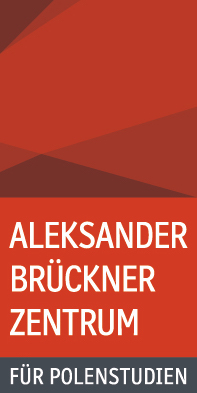
This academic internship turned out to be very fruitful for the internee. The aim of her stay in Halle was to broaden her knowledge of historical and cultural background of H. Jakubanis’, whose research in ancient philosophy is the central problem of her dissertation. In addition to delivering her paper, M. Sargsyan conducted library query in the collections of the MLU in Halle and took part in the activities of the ABZ. Her stay in Halle turned out to be successful, for she managed to enrich biographical part of her dissertation with information about the history of higher education in Central and Eastern Europe.
A unique experience for M. Sargsyan was her co-operation with international researchers, since scholars from Germany, Poland and Ukraine were involved in academic work at the ABZ. M. Sargsyan appreciated their continuous will to help, provide advice or simply enjoy a friendly conversation during lunch. For all this M. Sargsyan is very grateful. She enjoyed to observe the scholars who were carefully and attentively involved in their interdisciplinary research and who thus contributed to the development of the ABZ, which as a whole is succesfully led by prof. Yvonne Kleinmann. M. Sargsyan is very thankful for the academic atmosphere she had the opportunity to experience.
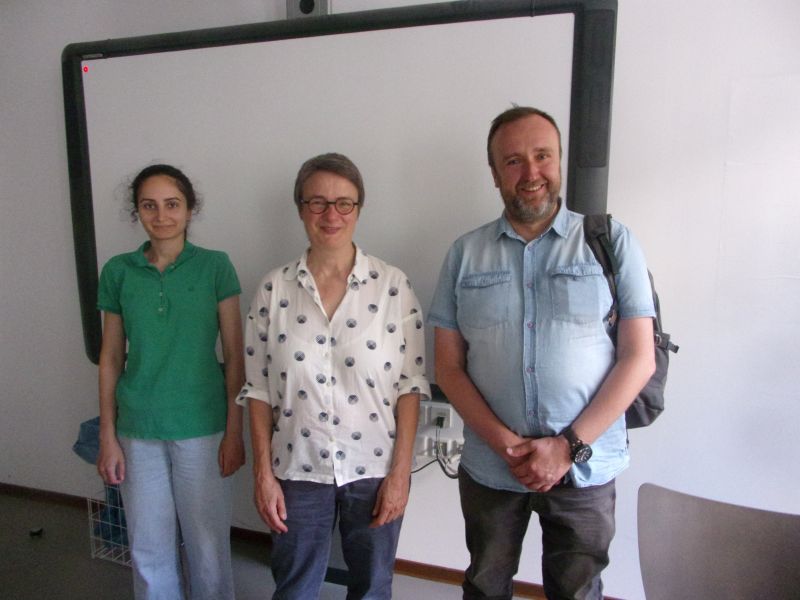
During the two final weeks of M. Sargsyan’s research stay in Halle she was accompanied by T. Mróz, supervisor of her disseration. Apart from academic activities, thanks to the initiative of prof. Sven Jaros, they were able to visit Marienbibliothek in Halle.
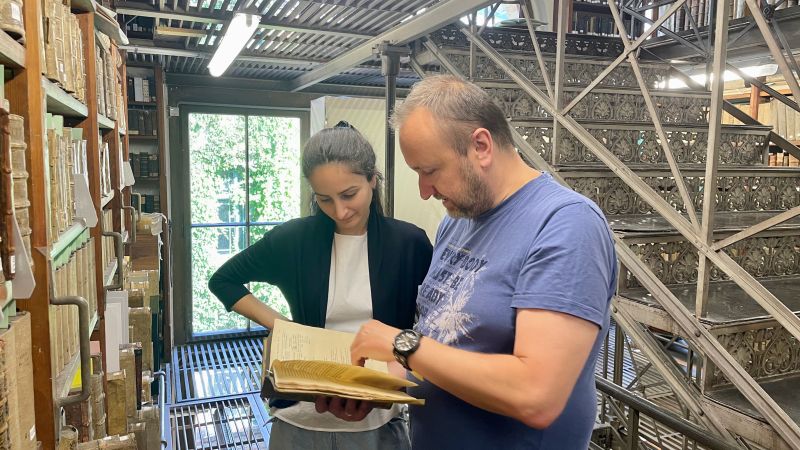
We hope that M. Sargsyan’s visit in Halle is not the final act of the co-operation between ABZ and AΦR. Let us only remark that in September 2023 ABZ is celebrating its tenth anniversary and has great plans for future academic development. Best wishes!
A Presentation on H. Jakubanis in Halle
On April 26, 2023, Mariam Sargsyan gave a talk at the Colloquium of Aleksander-Brückner-Zentrum für Polenstudien & Professur für Osteuropäische Geschichte in the Martin Luther University Halle-Wittenberg. The title of her presentation was: From Student at the Russian Imperial University in Kyiv to Respected Professor at the Catholic University in Lublin: The Career of Henryk Jakubanis, 1879–1949.
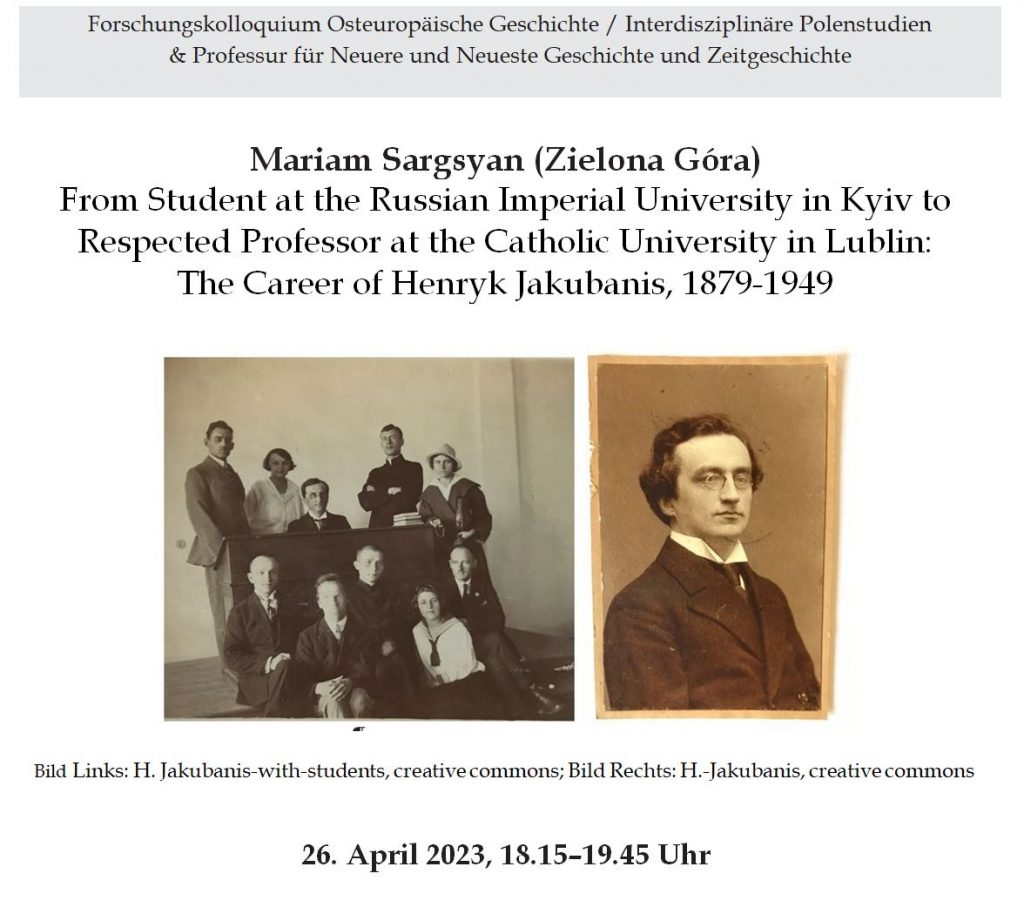
It was an important experience for M. Sargsyan to present a substantial part of her doctoral research, that is, the biography and major works of H. Jakubanis, to an audience consisting mostly of historians and not philosophers or historians of philosophy, and to receive their feedback and questions. The presentation, in addition to the highlights of Jakubanis’ life and career, included historical facts about Kyiv University, the 1st and 2nd World Wars, and peculiarities of academic life in pre-war Kyiv and post-war Lublin. The philosophical works of H. Jakubanis were also briefly discussed.
Results presented by M. Sargsyan, for example, approaching Jakubanis’ biography from the basically historical point of view, was in larger part an outcome of her NAWA scholarship at MLU Halle and her co-operation with the colleagues from Alexander-Brückner-Zentrum. It was an opportunity for her to take an attempt to compare life paths of Jakubanis with other imperial biographies, although at the moment it is impossible to research Kyiv archives.

The audience at M. Sargsyan’s paper asked questiones on a variety of topics: the academic identity of H. Jakubanis, was he a classics scholar, a philosopher, a historian of philosophy, or an academic teacher. The question of the connection and relationship between H. Jakubanis and his supervisor, Alexei Gilarov (1856-1938), turned out to be interesting as well, for Gilarov had a significant influence on Jakubanis and his methods in historiography of philosophy, on his lecturing at the university, but at a certain moment, their paths diverged. Jakubanis’ relations with Tadeusz Zieliński (1859-1944), who had not spared benevolent gestures to his younger colleague, turned out to be particularly interesting for the audience. Methodological questions appeared as well and they concerned a possible reconstruction of Jakubanis’ academic contacts in a form of a network. What proved to be attractive for the audience was the graphic depiction of Jakubanis’ journeys.
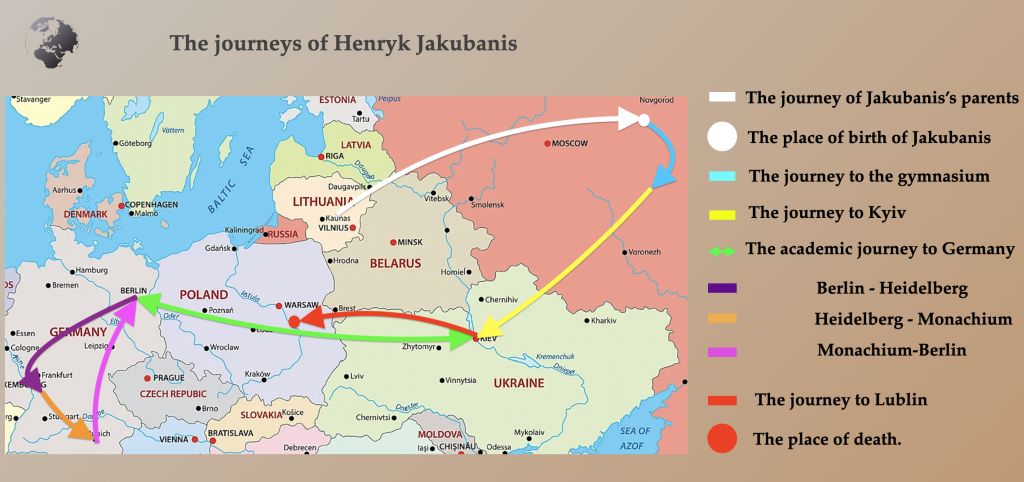
To sum up, M. Sargsyan’s presentation was informative for the public and beneficial for further development of her own research.
A Member of AΦR Received a NAWA Scholarship
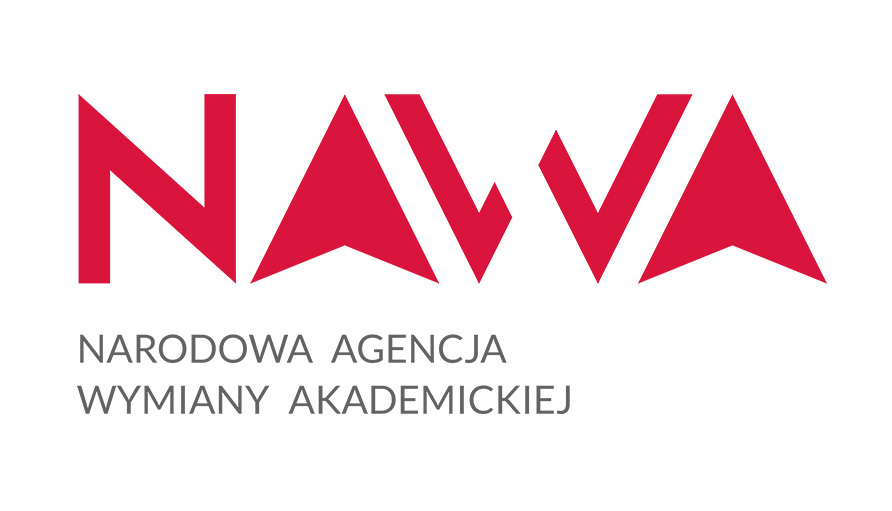
Mariam Sargsyan, already a member of the AΦR research group and a grantee in National Science Centre (NCN) project on Henryk Jakubanis (Генрих Якубанис: 1879–1949) and his works on ancient Greek philosophy, has recently received a scholarship from NAWA (Polish National Agency for Academic Exchange). The programme’s name is NAWA Preludium Bis 2 and it is intended exclusively for doctoral students working under NCN projects in doctoral schools. The aim of NAWA Preludium Bis 2 programme is to support international mobility of doctoral students by enabling them to gain academic experience in international research centres.

Considering the topic of M. Sargsyan’s dissertation, H. Jakubanis, a scholar whose career started successfully in Saint Vladimir Imperial University of Kyiv, at first she intended to spend her internship in Kyiv, in Taras Shevchenko National University of Kyiv. After the Russian invasion on Ukraine, unfortunately, her research stay there turned out to be impossible.
In these circumstances the plans had to change and eventually M. Sargsyan’s scholarship will be spent in Germany, at the Martin Luther University in Halle, and to be more precise, at the Aleksander Brückner Centre for Polish Studies (ABZ), from April to July 2023. Scholars connected to ABZ research both historical and present-day developments in Polish politics, society, language, and culture in multidisciplinary perspective. Professor Yvonne Kleinmann, who is the Head of ABZ, agreed to be an academic supervisor of M. Sargsyan’s scholarship.
The main goal of M. Sargsyan’s internship is to research historical and cultural circumstances of Jakubanis’ life and to enrich her thesis with literature hardly available in Poland. It will significantly contribute to producing a comprehensive biographical, historical and philosophical study of this historian of philosophy.
The list of M. Sargsyan’s tasks in Halle includes: preparation and presentation of a paper at the Colloquium of East-European History (Interdisziplinäres Kolloquium Osteuropäische Geschichte / Polenstudien) and participation in the activities of ABZ.
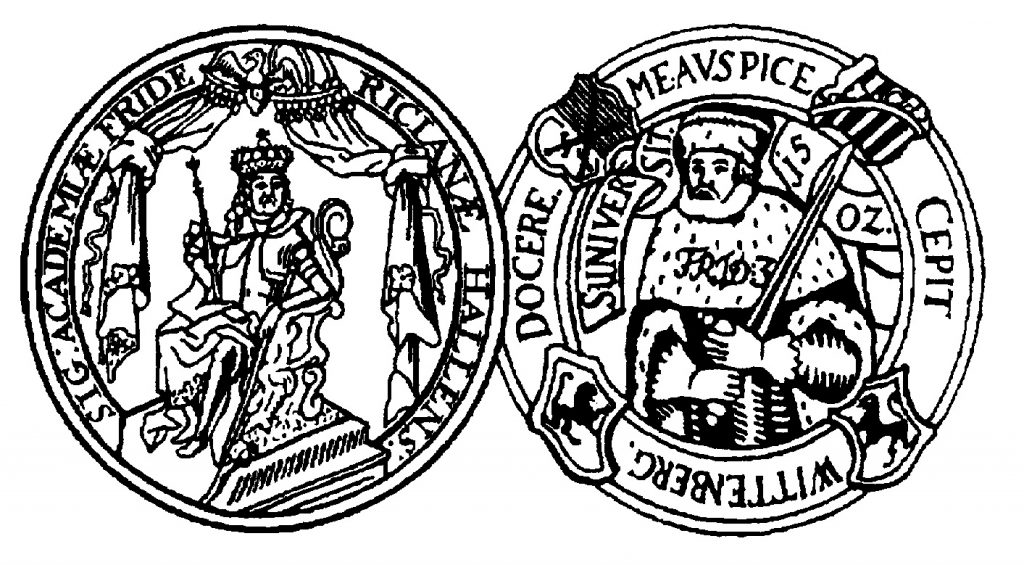
History of Philosophy in Poland in Martin-Luther-Universität Halle
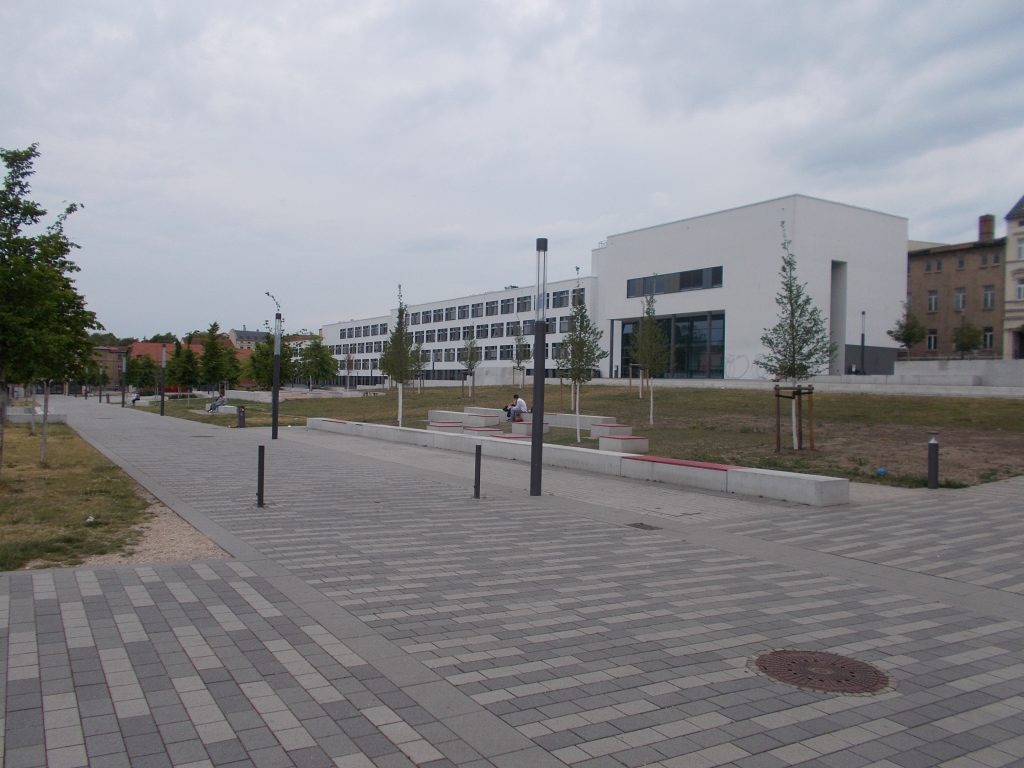
Selected Topics in the History of Philosophy in Poland was the title of the course, which was delivered in May and June 2022 by Tomasz Mróz for the students of Martin-Luther-Universität (MLU) Halle in the building of the Steintor Campus (on the left). T. Mróz was appointed at MLU as Gastprofessor (funded by Deutscher Akademischer Austauschdienst DAAD) for a month at the Aleksander-Brückner-Zentrum für Polenstudien (Institut für Geschichte).
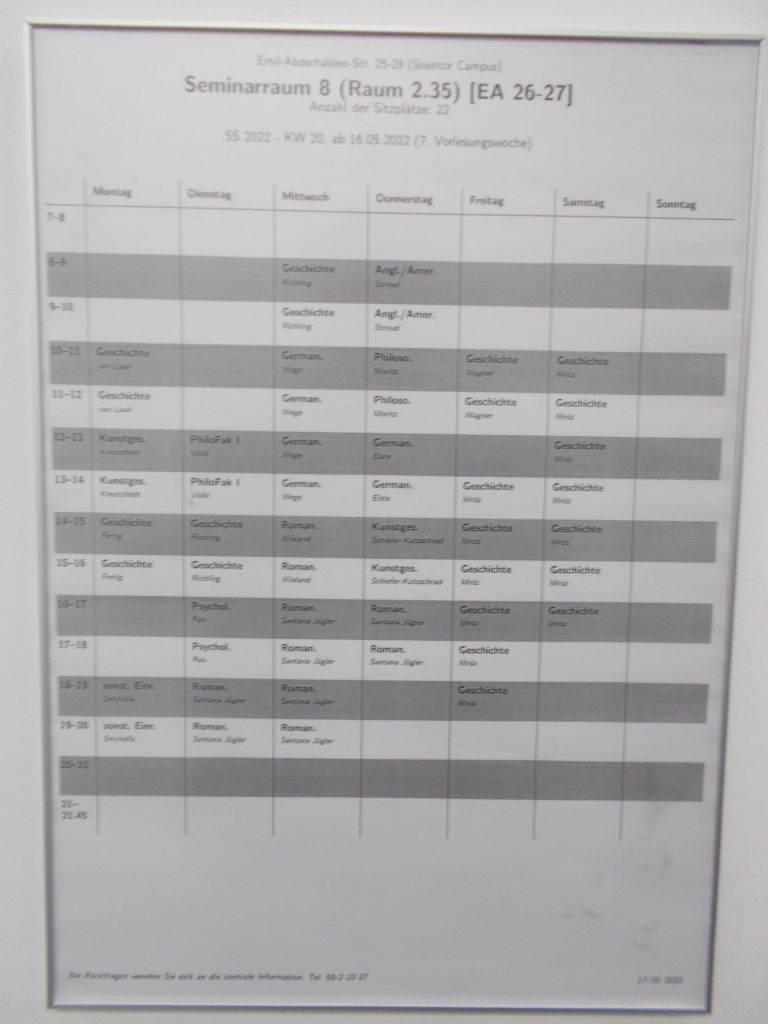
The course had a form of “Blockseminar” meetings and consisted of lectures, seminars and students’ presentations, focusing on various ideas, currents and problems in the history of philosophy in Poland. A course like this could not, obviously, do without a closer insight into some issues of ancient philosophy reception. For example, reception of Aristotle’s philosophy of nature in Vitello’s theory of demons and Pythagorean and Platonic inspirations in Copernicus were discussed. During one of the final lectures the problems of Plato reception in Poland were presented, as they were previosuly structured in the book Plato in Poland 1800-1950. The works of the following authors were briefly examined: A.I. Zabellewicz, F.A. Kozłowski, W. Tatarkiewicz, P. Semenenko, B. Limanowski, W. Dzieduszycki, E. Jarra, S. Pawlicki, W. Lutosławski, S. Lisiecki and W. Witwicki.
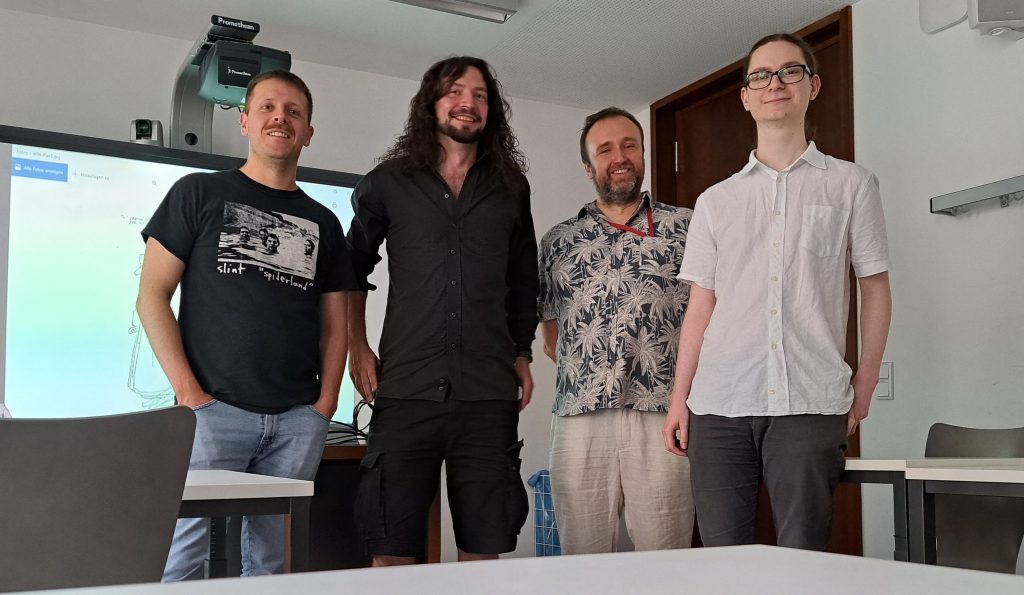

All the students attending the course in Polish philosophy should be thanked for their dilligence, co-operation and their presentations. The lectures, however, wouldn’t have taken place without the granting decision of professor Yvonne Kleinmann, who holds a chair in the East-European history at MLU and is the head of the Aleksander-Brückner-Zentrum für Polenstudien, and without co-ordinating work of doctor Paulina Gulińska-Jurgiel, to both of whom the lecturer is extremely grateful.
Plato’s Adventures with Censorship in Poland
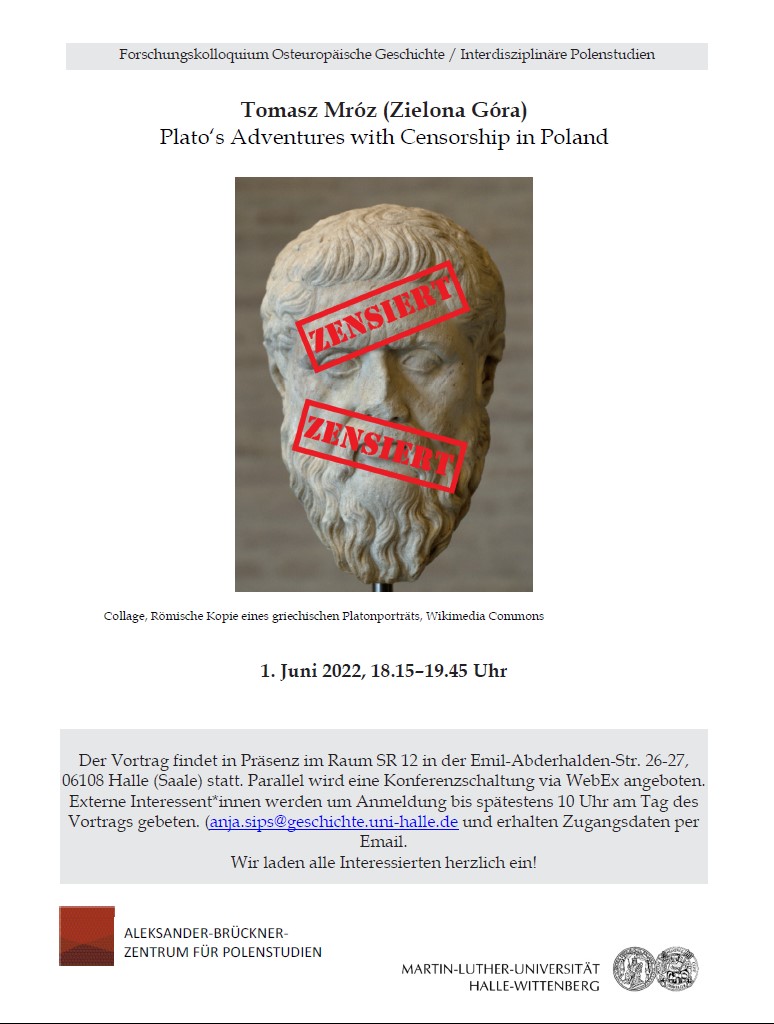
On June, 1st, a talk by Tomasz Mróz was delivered at the Interdisziplinäre Kolloquium Osteuropäische Geschichte / Polenstudien (Martin-Luther-Universität Halle). The topic of the presentation was the interference of various types of (broadly understood) censorship with Plato scholars and research on Plato in Poland. T. Mróz discussed three (and a half) cases of such interference. The talk was a supplemented and developed version of one of Mróz’s previous papers.
The first case of censorship was relatively harmless, for only one word, namely: socialism, was removed from the title of Wincenty Lutosławski’s book, Plato as a Creator of Idealism [and Socialism], (Warsaw 1899). Imperial Russian authorities in Warsaw removed the word “socialism” from the title and from the table of contents, without even looking into the text of his book on Plato, for “socialism” occurs on many pages, being – in Lutosławski’s view, a natural consequence of idealism.
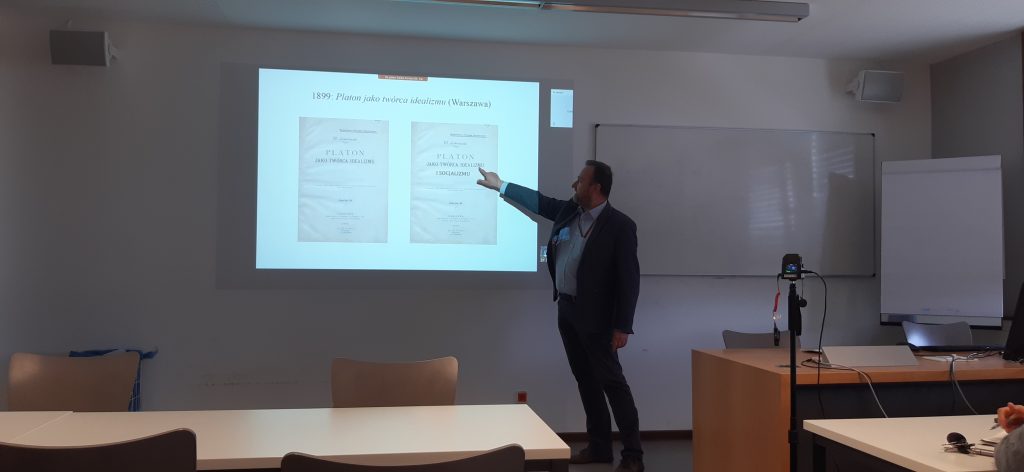
Stanisław Lisiecki represented another case of broadly understood censorship. He was an enthusiast of Plato and a translator of his dialogues, but only his Republic saw the light of day in the interwar period, while all the remaining dialogues were left unpublished in the manuscripts. His leaving the clergy and Roman Catholic church was the most probable the reason of his difficult situation in Polish academia, for some scholars were unable to accept him as a colleague and assess his works without religious prejudice. As a result, his works were not published, but some justice in this regard has been recently done by the members of the AΦR research group.
Władysław Witwicki was more succesful in his translations of Plato’s works. Soon after the Word War II he managed to publish a small book on Plato (Plato as an Educationalist, 1947) and a translation of Plato’s Republic (1948). In the book and in his commentaries to Plato’s text, he compared the post-war reality of Poland and Plato’s political project to a concentration camp, great monastery, or a totalitarian state. Some of his remarks were censored and the second edition of the Republic (1958) appeared in print in an ideologically “corrected” version.
As the additional “half” of the censorship cases, Witwicki’s struggle with his sister, who was a Catholic nun, were presented. She tried to convince him not to criticize Catholicism in his commentaries, but he replied to her with a short comic story depicting his and Plato’s imaginary meeting with her, and Plato’s escape from holy water.
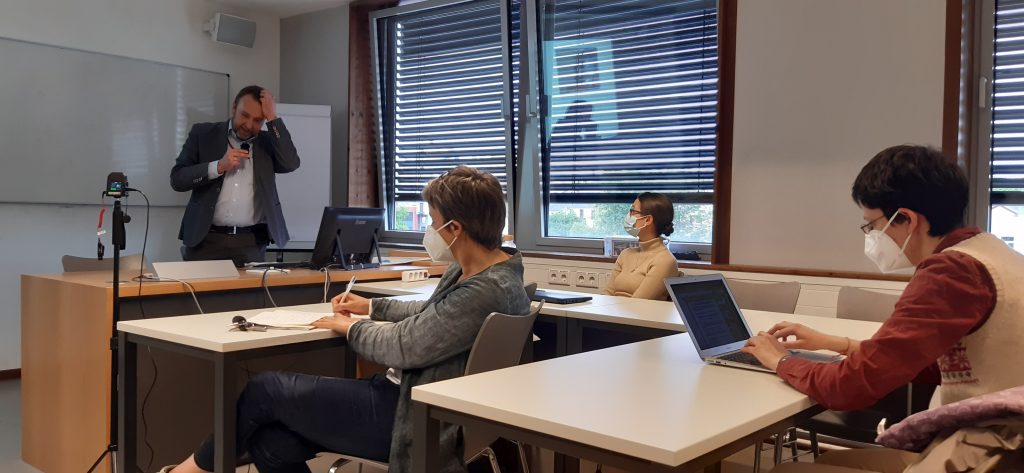
Thanks to the fact that the audience consisted of specialists in East-European history, in philosophy and in the historiography of philosophy, a wide spectrum of questions appeared and the author did his best to satisfy multi-oriented demands of the public.

T. Mróz’s stay in Halle was sponsored by Aleksander-Brückner-Zentrum für Polenstudien from the funds of Deutscher Akademischer Austauschdienst (DAAD).
Recent commentaries